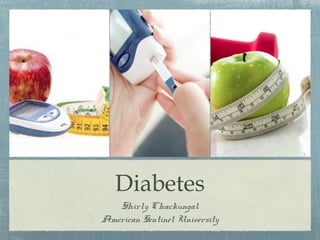
6480958 chackungal bsn25_11_a_12july_powerpoint_10march
- 1. Diabetes Shirly Chackungal American Sentinel University
- 2. Diabetes Diabetes is usually a lifelong (chronic) disease in which there are high levels of sugar in the blood.
- 3. factors Insulin is a hormone produced by the pancreas to control blood sugar. Diabetes can be caused by too little insulin, resistance to insulin, or both. To understand diabetes, it is important to first understand the normal process by which food is broken down and used by the body for energy. Several things happen when food is digested: A sugar called glucose enters the bloodstream. Glucose is a source of fuel for the body. An organ called the pancreas makes insulin. The role of insulin is to move glucose from the bloodstream into muscle, fat, and liver cells, where it can be used as fuel.
- 4. factors People with diabetes have high blood sugar because their body cannot move sugar into fat, liver, and muscle cells to be stored for energy. This is because either: Their pancreas does not make enough insulin Their cells do not respond to insulin normally Both of the above
- 5. factors There are two major types of diabetes. The causes and risk factors are different for each type: Type 1 diabetes can occur at any age, but it is most often diagnosed in children, teens, or young adults. In this disease, the body makes little or no insulin. Daily injections of insulin are needed. The exact cause is unknown. Type 2 diabetes makes up most diabetes cases. It most often occurs in adulthood. However, because of high obesity rates, teens and young adults are now being diagnosed with it. Many people with type 2 diabetes do not know they have it. Gestational diabetes is high blood sugar that develops at any time during pregnancy in a woman who does not have diabetes. Diabetes affects more than 20 million Americans. Over 40 million Americans have pre- diabetes (which often comes before type 2 diabetes).
- 6. Topic of Choice: Diabetes prevention Diabetes prevention
- 7. Goal The goal of this power point project is to raise awareness on what diabetes is and how to prevent it and treat it.
- 8. Miami Florida Outpatient Clinic in the hospital
- 9. Audience: Registered Nurses Registered Nurses Registered Nurses are chosen so they can teach their patients what is needed to be done.
- 10. IMPLEMENTATION In order to implement this project I want to provide nurses with the proper education on diabetes so that they may pass on their knowledge to their patients about what diabetes is and how to help prevent it. As well as teaching diabetic patients how to treat and take care. This includes diet control and nutrition. Understanding of all oral medication and insulin which is prescribed by the physician.
- 11. OVERVIEW This can be done by having the class in the hospital provided to each nurse. In educating nurses we will first go over what is diabetes and gain a full understanding of what it is and how it is caused. They will understand the differences between type 1 and type 2 diabetes. Nurses will gain an understanding of how to prevent this disease. They can grasp what should and shouldn’t be done so that their patients can prevent being put under risk especially if diabetes runs in their family. By this they will understand the importance of nutrition in their daily lives. Nurses will also gain understanding of what should be done to treat patients that have diabetes.
- 12. Teaching Strategies Teaching strategies include doing things that engage the people learning This includes presentations with interactive material Trying to show how the choices thye make can impact the rest of their lives Educational material for them to read Texts and Books
- 13. Expected Outcome The expected outcome is that nurses will be educated to know about the importance of the choices they make towards diabetes. They will be able to properly educate their patients on what they can do about this disease and fully understand how to treat it if they have.
- 14. References Chaney, D. (2012). Structured diabetes education for children and adolescents. psychology and nursing partnership manager, lecturer in nursing/option leader diabetes. Double Blind Peer Reviewed. 10-16; 27 (6): 41-47. Pipe-Thomas, P. (2012). The importance of structured diabetes education programmes. In Specialist dietitian for diabetes, . Barnsley Hospital NHS Foundation Trust. 23 (10): 495-8. (23 ref) Venkatesh, S. (2013). Social and health care provider support in diabetes self-management. In Doctoral Student, Department of Food Science and Human Nutrition. American Journal of Health Behavior. 37 (1): 112-21.